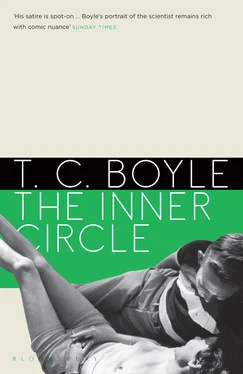On the way back in the car, while Iris and I were buzzing over the possibilities—“That room under the stairs, it’s perfect for a study, John, your own study”—Prok pulled his trump card. He’d been uncharacteristically silent as the frozen fields rolled by and the tires snatched at the piebald pavement between humps of ice and compacted snow, and suddenly he raised his voice and said, “I really don’t know if I can see my way to making this loan under the circumstances — that is, John,” and he snatched his eyes from the road to give me a sidelong look—“if I don’t approve of the property, and I most emphatically do not, because I do have to protect my investment, you understand.”
Iris came right back at him, more sharply than I would have liked, but she was right, and I had to admit it. “We appreciate everything you’ve done for us,” she said, biting off her words as if she were paying by the syllable, “but you have to understand that we’ll be living in that house, not you. It’s our decision, not yours. And if we have to overex-tend ourselves, if I have to get a second job, scrub floors, anything, we’ll make it, with or without your help.”
“I don’t think so,” he said, fighting to control his voice.
“Iris,” I said.
“No, John, let me have my say.”
The Buick sailed over the road like a ship at sea, Prok’s hands tightening on the wheel as the tires fought for purchase and slipped again on a rolling white patch of ice.
“Listen, Prok,” she said, leaning into the front seat now, her hands clamped to the fabric on either side of his head, leaning in close so he wouldn’t mistake her, “if you think I’m going to be dictated to or bullied or blackmailed, then you don’t know me very well.” There was a bump, and then the long soft shush of the ice. “No,” she said, “you don’t know me at all.”
Escrow closed at the end of January, and though Prok was a bit brusque when I asked, he gave me the day off and the use of the Nash (veering and uncertain, but still running and still capable of hauling a load) to facilitate the move. Both Corcoran and Rutledge had volunteered to help, but as time was running out on the male volume and Prok growing increasingly edgy, they couldn’t be spared, and so I hired a man for the day and together we dismantled the bed, removed the legs from the kitchen table and shouldered the couch and armchair out the door. The Nash, which Prok had modified into a kind of van, took the larger items, and my own car — the 1938 Dodge D8 Coupe I’d gone out and purchased for two hundred fifty dollars the day after we made an offer on the house, because what was the sense of saving for a rainy day when the deluge was already on us — ferried the boxes of clothes, dishes, records, books, cosmetics, silverware, mops, brushes, tools, pots, pans, foodstuffs and all the rest of the accumulated and husbanded necessities of an American household at the midpoint of the twentieth century, and it was amazing to contemplate how much we’d managed to acquire during our five years in the apartment.
Iris was in her glory. I didn’t want her fatiguing herself — she was in her fourth month now and just beginning to show, if you looked at her in the right light, that is — but there was no stopping her. She’d been busy packing for weeks, making lists, discarding various objects and procuring others, doubling brown paper bags and reinforcing cardboard boxes with masking tape. On the day of the move, she wrapped a kerchief round her head, vomited for the last time in the old toilet on Elm Street, and had me take her and a full carload out to the new place before the sun was up. While the hired man and I wrestled the furniture out the door of the apartment she was busy lining the shelves at the house, and by the time we’d got down to arranging the couch and chairs in the new place (as per her very explicit directions), every box and brown paper bag was empty, the drawers were filled with neatly folded shirts, socks and underwear, the pantry stocked and the statue of Aphrodite cum ashtray occupying a position of honor on the mantelpiece.
We had hamburger sandwiches and french fries out of a greasy paper sack that night, washed down with Cokes, and for me, two or three hard-earned bourbons and water. I found a heap of scrapwood in a shed out back and got a good blaze going in the fireplace, and we sat on the newly unscrolled carpet and ate in front of it. For a long while we just sat staring into the flames, content to be there together, enjoying our first meal in our new house. “God, I love a fire,” she said, looking around for something to wipe her hands on. There was a sheen of hamburger grease on her lips. Behind her, propped against the side of the couch, were the four prints that had graced the wall of the apartment and a much bigger framed reproduction of Modigliani’s Nude on a Blue Cushion, a housewarming gift from Prok and Mac.
“Me too,” I said, and I handed her the empty hamburger sack to use as a napkin, because neither of us felt like getting up.
“The wallpaper has to go though,” she said. “We need something lighter, to brighten the place up. The smoke darkens things too, you know — years of it, the little bit that drifts back into the room? But that’s why I haven’t even thought about hanging the pictures yet — new wallpaper, that’s a must. And the furniture. I’m not sure about the furniture yet either. You think the couch looks strange there, out in the middle of the room like that? I thought it would help divide up the space—”
I watched her ball up the grease-spotted bag and toss it into the fire, the flames rising and falling back again, and then I shrugged. “Looks fine to me. But whatever you want. You just tell me when you’re ready to pick out the paper.”
“I don’t know,” she said, running her gaze around the room. “I’ll look at patterns tomorrow, because I really didn’t want to do anything till we were actually in the house — you have to live in a place before you can get a feel for it, my mother always said that, but the walls are too dark, much too dark. We don’t want people to think we’re living in a cave, do we?” She paused, biting her underlip, looking right through me. “But that nude. I don’t know about that nude.”
“What? The Modigliani? It’s a famous painting, a great work of art. I think it’d look nice, maybe on that wall there, by the staircase. Or maybe over by the window?”
“I don’t know. A nude. What kind of statement does that make?”
“It doesn’t make any statement. It’s just art, that’s all. Just a painting.”
“Oh, come off it, John — four woodcuts of Emily Brontë scenes and a two-and-a-half-by-three-foot nude?”
“But what about Prok? He’ll, well, he’ll expect—”
“Yeah,” she said, and her eyes were focused now, flaring up and then settling on me like a pair of flamethrowers, “Prok, Prok, Prok.”
Outside it was windy, with temperatures in the teens. The windows shook and we listened to the sounds of the house a moment, alien sounds that would grow increasingly familiar, day by day, till they provided the sound track for the rest of our lives. “Let’s not spoil this,” I said. “Hang it anywhere you want, I don’t care.”
“That’s nice, John,” she said. “Very magnanimous. How about the toolshed? Will that do? Think a nude’ll liven it up and remind us how we make our bread and butter here every time we need a crosscut saw or a what, a monkey wrench?”
“Don’t,” I said. “Just don’t.”
The fire chased shadows across the walls. The cat, which had been padding tirelessly round the place all day long, in search of mice or the scent of mice, trotted across the room and disappeared in the darkened hallway that led to the kitchen. I got up then and poured myself another drink, the bottle shaped perfectly to my hand as if it were the most familiar thing in this new environment, more comforting than the transposed furniture and the Aphrodite or even Iris with her accusatory eyes and tragic underlip. “You know, it’s a shame you can’t take a drink,” I said. “I think a drink would really help loosen you up a bit. You should be happy — aren’t you happy? Iris?”
Читать дальше












